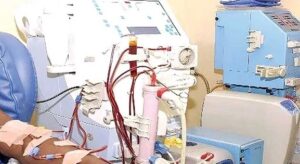Renal Patients Association calls for comprehensive NHIS coverage
 Mr Baffour Kojo Ahenkorah, President of the Renal Patients Association of Ghana, has urged the government to ensure that the National Health Insurance Scheme (NHIS) benefits all renal patients, instead of just a few.
Mr Baffour Kojo Ahenkorah, President of the Renal Patients Association of Ghana, has urged the government to ensure that the National Health Insurance Scheme (NHIS) benefits all renal patients, instead of just a few.
He said that nearly all renal patients were cash-strapped and could no longer afford treatment, thus comprehensive coverage was required.
Dr. Aboagye Da-Costa, Chief Executive of the National Health Insurance Authority (NHIA), announced that the government would soon disburse GH¢2 million, which was approved by Parliament, to provide dialysis treatment for those in need.
The funds, granted in March, were in response to renal patients’ appeal for the government’s support, following the increase in the cost of dialysis.
The Korle-Bu Teaching Hospital last Monday increased the cost of dialysis from GH¢380 to GH¢491, which was approved by Parliament.
Dr. Da-Costa had said that the committee formed to implement the disbursement had completed its report and would begin distributing funds to various hospitals over the next two weeks, expressing hope that the payout would provide some relief to patients.
In an interview with the Ghana News Agency, Mr Ahenkorah stated that while the NHIS coverage was encouraging, paying just for those in need was not, as many patients were dying due to a lack of financial resources.
“Why is it for only needy patients since all of us under dialysis are needy. Can you imagine how I’ve been on the machine for the past nine years? I don’t even have GH¢5 in my account. And that is not needy,” he questioned.
Mr Ahenkorah argued that the increase in dialysis fees was excessive and would worsen patients’ predicament.
“We are looking at GH¢491.00 instead of the old fee of GH¢380.00, which is not welcome at all because renal patients will not be able to pay,” he stated.
The Renal Unit at Korle-Bu Teaching Hospital was closed in May 2023 due to a partial renovation, only to reopen to patients in October at a higher treatment cost.
However, due to patient and public protest over hike in treatment cost from GH¢380 to GH¢765.42, the hospital was quickly closed, although intensive care was available for emergency cases.
According to Mr Ahenkorah, the implementation of the price increase would make renal patients unable to afford treatment.
“Patients were not paying for the old price. A philanthropic organisation, First Sky Group had paid for renal sessions for almost 270 patients for the past seven years because most of the patients were vulnerable,” she said.
Mr Ahenkorah said that even if renal patients were required to pay GH¢100 every week for the next ten years, they would be unable to do so because dialysis was a lifelong issue.
He said that the Association intended to meet with the Parliamentary Select Committee on Health when the House resumed on May 17, 2024, to discuss the issue, as many lives were being lost because of the situation.
“We beg them that If they say they are trying to do something about the Health Insurance then they should get all of us involved.”
Source: GNA
